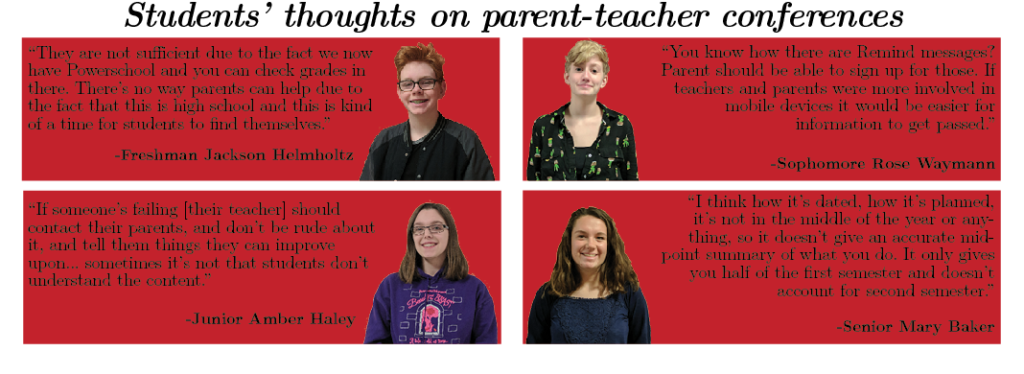By Staff
Once every fall, parents of Dexter students visit the high school for an hour or more of conversations with teachers they don’t know and about classes they probably aren’t familiar with at parent-teacher conferences. By the second semester, the information isn’t relevant anymore, due to the fact their students’ classes, teachers, and overall performance are likely all different.
Since many parents may forget what they learn at conferences and get no point of reference for the next semester, one conference isn’t enough to inform them of how their students are doing. Often, just looking at a student’s grades isn’t enough to understand the big picture of that student’s performance, since social factors and behavior also play a role in education. As such, parents need a far more reliable and consistent mode of communication than one conference a year.
The concept of parent-teacher conferences isn’t inherently flawed—it’s important for parents and school faculty to have a dialogue in order to help their students succeed in school, and conferences are a great way to accomplish that. The issue lies in the only official, scheduled form of communication that parents and teachers have during the school year being once-a-year conferences. Not only that, but also having the conference at the beginning of the year means that parents don’t see the change, or lack thereof, in their students’ performances. By second semester, classes have changed and students themselves have changed.
Even if parents could realistically get the full scope of school performance from one meeting, they might not go to conferences. Most parents have to work, run errands, and care for other children every weekday; therefore, they don’t have time to visit the school on a normal evening. The school does try to remedy this by making it half day and running conferences from 1-4 p.m. and 5:30-8 p.m., but this still doesn’t mean that every parent will be able to attend. Other parents may not attend simply out of laziness or lack of care, which is unfair to the student. Parents need more than one official opportunity to meet with teachers throughout the year.
“First semester needs more time, because freshmen are coming in, and if a student’s having trouble you want to catch it early in the year,” English teacher John Heuser said. “But I think having something second semester would be valuable.”
Teachers of semester-long classes are also put at a disadvantage by the lack of a second semester conference.
“I teach semester-long courses, so when I switch students I don’t get to meet their parents,” Heuser said. “I like what we do, but I don’t think touching base with parents second semester is a bad idea.”
Some may argue that curriculum night and open house are opportunities for teachers and parents to meet, but these aren’t useful for anything but meeting a teacher and the understanding general goals of a course. At the beginning of the year, teachers don’t know students’ personalities or abilities, and parents can’t gain any information about how a student is doing from these meetings.
“There’s not enough time to distinguish between teachers,” psychology and sociology teacher Tracy Stahl said. “Parents might feel good about knowing who’s going to be in front of their students every day, but beyond that I don’t think it has any greater significance.”
Hosting a conference once each semester would be a great step toward involving parents in education and helping students receive the support that they need. In addition, guardians could be allowed to sign up for classroom notifications to see what work their student needs to be doing. Teachers need to further establish a connection with their students’ parents in order to keep them up-to-date.
Parent-teacher conferences aren’t a lost cause or useless—far from it—but work needs to be done before they can truly be beneficial to everyone.
